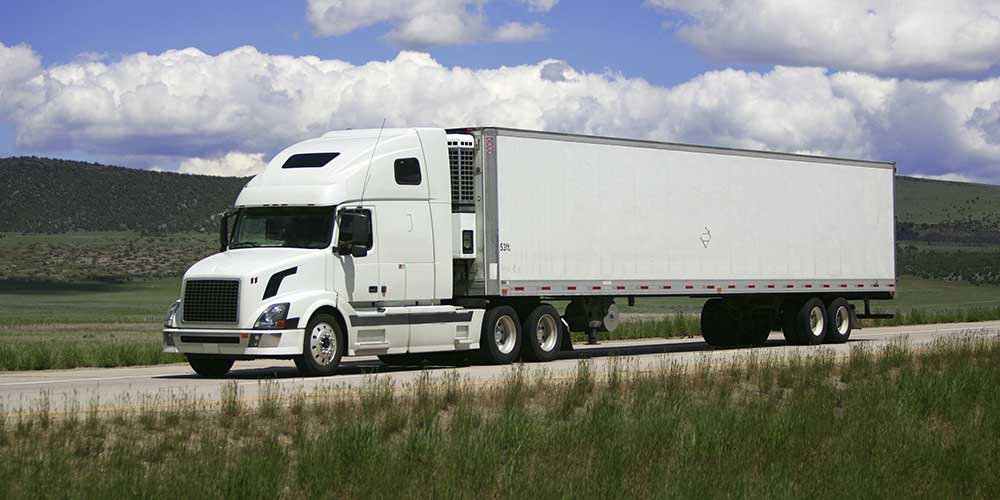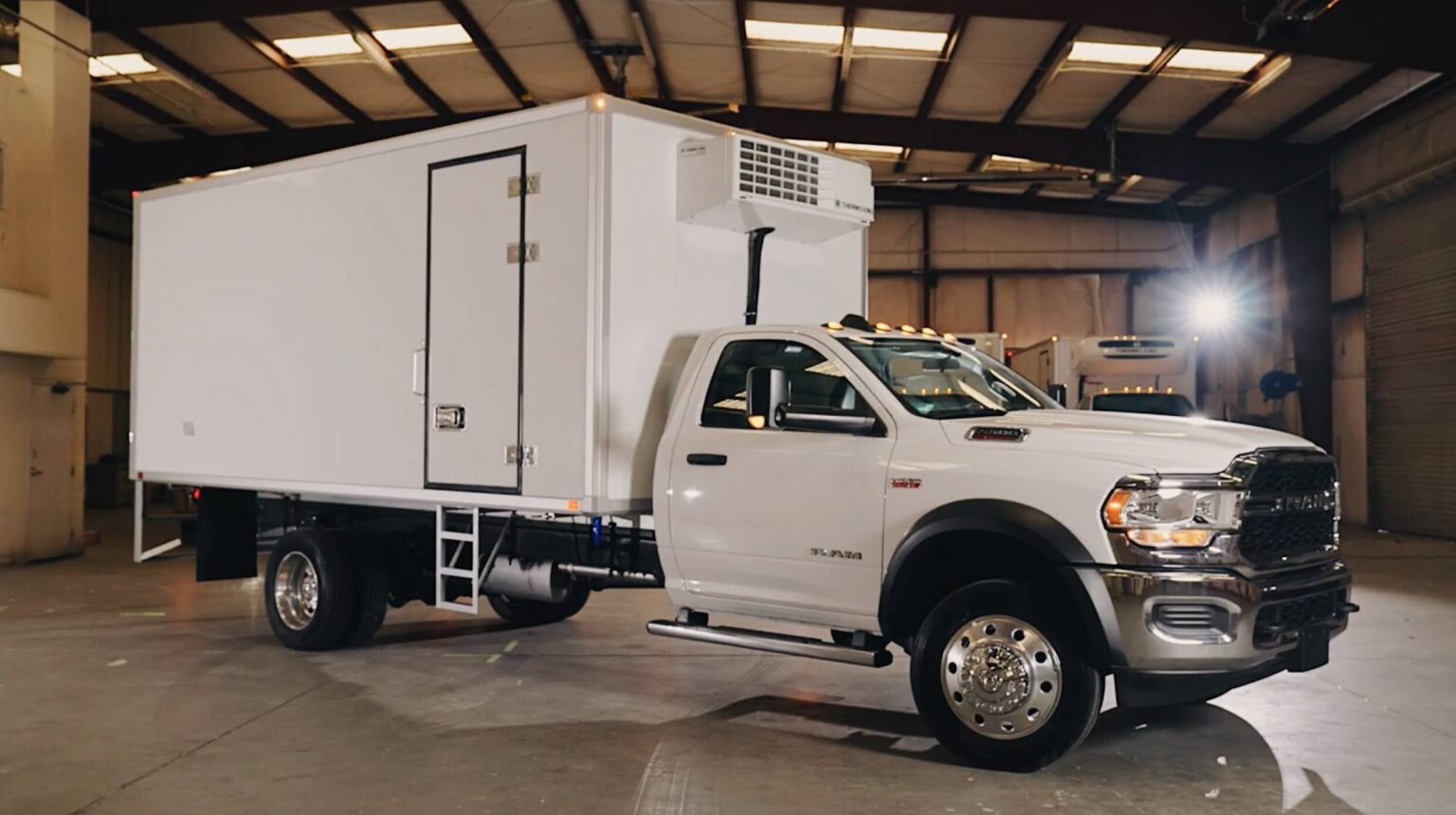Reefer Trucks Thermo King: Trusted for Temperature-Sensitive Item
Reefer Trucks Thermo King: Trusted for Temperature-Sensitive Item
Blog Article
Leading Advancements in Transportation Refrigeration: Enhancing Performance and Safety
The landscape of transport refrigeration is undertaking substantial makeover, driven by advancements aimed at enhancing both efficiency and security. As these advancements proceed to progress, it is vital to explore their ramifications on functional methods and regulative conformity, triggering a closer assessment of how they improve the future of transport refrigeration.
Smart Temperature Checking Solutions
In the realm of transportation refrigeration, wise temperature level tracking systems have emerged as a crucial innovation for guaranteeing the integrity of temperature-sensitive goods. These advanced systems take advantage of Web of Points (IoT) modern technology to give real-time data on temperature level fluctuations, making it possible for operators to maintain ideal problems throughout the supply chain. By continuously tracking the temperature level of cooled containers and cars, companies can quickly determine discrepancies that might compromise product high quality.

Additionally, wise monitoring systems commonly include automated alerts and notices, allowing stakeholders to react promptly to any kind of potential concerns. This positive strategy not just minimizes the risk of spoilage however additionally improves conformity with governing requirements controling food safety and pharmaceutical transport.
The assimilation of data analytics within these systems additionally assists in predictive upkeep, helping operators to anticipate potential equipment failings before they happen. This capability reduces downtime and optimizes operational efficiency, inevitably resulting in set you back savings.
Eco-Friendly Refrigerants
Smart temperature surveillance systems play an important function in maintaining product quality, but the efficiency of transport refrigeration also depends upon the selection of refrigerants utilized. As environmental problems rise, the change in the direction of environment-friendly cooling agents has actually become important. Standard cooling agents, such as hydrofluorocarbons (HFCs), are well-known for their high Worldwide Warming Possible (GWP), contributing substantially to environment change. In contrast, arising alternatives like hydrocarbon-based cooling agents and hydrofluoroolefins (HFOs) existing lower GWP alternatives, using both efficiency and sustainability.
These green cooling agents not just lessen ecological effect but likewise line up with worldwide policies targeted at eliminating hazardous substances. Their adoption can cause improved energy performance, ultimately lowering operating expense for transport refrigeration systems. Additionally, making use of all-natural cooling agents, such as ammonia and co2, has acquired traction because of their excellent thermodynamic residential properties and lower ecological footprint.
Purchasing green cooling agents is not simply a regulative conformity procedure; it represents a calculated choice that enhances brand online reputation and fosters consumer commitment. reefer trucks thermo king. By prioritizing lasting techniques, companies can add to a greener future while ensuring the stability of transported products
Advanced Insulation Materials
Using innovative insulation materials is important for enhancing transportation refrigeration systems, as they considerably improve energy performance and keep regular temperature control. Traditional insulation approaches often fall brief in protecting against thermal transfer, bring about raised energy usage and rising and fall temperature levels within chilled compartments.
Arising materials such as vacuum cleaner insulated panels (VIPs) and aerogels use exceptional thermal resistance, permitting for thinner accounts without jeopardizing efficiency. VIPs, for example, use a vacuum cleaner layer to lessen conductive and convective heat transfer, making them ideal for space-constrained applications. Aerogels, known for their lightweight and permeable framework, give remarkable insulation while substantially decreasing total system weight.
Furthermore, including phase modification materials (PCMs) into insulation systems can further stabilize temperature levels throughout transit. These products soak up and release thermal energy, efficiently buffering against outside temperature variations.
The integration of these advanced insulation products not just decreases the functional costs connected with power consumption but likewise extends the rack life of temperature-sensitive goods. As the transport refrigeration sector continues to develop, the adoption of ingenious insulation technologies will be critical in improving both efficiency and safety in cooled transport.
Automated Route Optimization
The efficiency of transportation refrigeration systems is considerably boosted with automated course optimization, which leverages innovative algorithms and real-time information to determine the most reliable paths for distribution. By evaluating different factors such as website traffic patterns, climate condition, and distribution windows, these systems can considerably minimize traveling time and gas usage.
Automated course optimization lessens human mistake and subjective decision-making, which can lead to inadequacies. This modern technology allows fleet managers to allot sources much more properly, guaranteeing that cooled items keep their called for temperature throughout the trip. By maximizing routes, business can likewise improve client satisfaction through timely distributions.
In addition, automated systems can adapt to unexpected situations, such as road closures or unexpected web traffic spikes, permitting vibrant rerouting. This flexibility not just secures the honesty of temperature-sensitive items however likewise adds to total functional performance.
Applying automated course optimization can cause substantial price savings while minimizing the carbon footprint connected with transportation. As services progressively prioritize sustainability, this technology stands apart as an important component in modern transportation refrigeration, straightening functional goals with environmental duty. Inevitably, automated route optimization represents a significant development in the mission for performance and safety and security in transport refrigeration.

Real-Time Information Analytics
Automated course optimization substantially take advantage of the integration of real-time information analytics, which provides vital understandings right into the efficiency of transport refrigeration systems. By making use of real-time data, transport drivers can keep track of temperature changes and tools performance, her latest blog making sure that disposable items are maintained within required criteria throughout transit. This positive method not only boosts the quality of the transported items however also minimizes the risk of spoilage and loss.

In enhancement to enhancing efficiency, real-time analytics enhances security by guaranteeing compliance with regulatory requirements for temperature level control. This not only shields public wellness however additionally strengthens a business's online reputation - thermo king transport refrigeration. As the transportation refrigeration market advances, the assimilation of real-time information analytics arises as a keystone for driving innovation, sustainability, and operational excellence
Final Thought
Finally, the advancements in transport refrigeration significantly improve both efficiency and security within the sector. Smart temperature level tracking systems and real-time data analytics offer essential oversight, while environmentally friendly refrigerants and advanced insulation products add to sustainability and power effectiveness. Automated path optimization algorithms not only minimize travel time however likewise lessen ecological impact. Collectively, these developments represent an important evolution in transport refrigeration, making certain conformity with regulative criteria and advertising a greener future.
The read landscape of transport refrigeration is going through substantial makeover, driven by developments aimed at enhancing both performance and safety.Smart temperature monitoring systems play a crucial role in preserving product high quality, but the performance of transport refrigeration likewise hinges on the choice of refrigerants made use of. Their adoption can lead to improved energy performance, inevitably minimizing operating expenses for transport refrigeration systems. Inevitably, automated path optimization stands content for a considerable improvement in the mission for performance and security in transportation refrigeration.
In final thought, the improvements in transport refrigeration substantially boost both efficiency and security within the industry.
Report this page